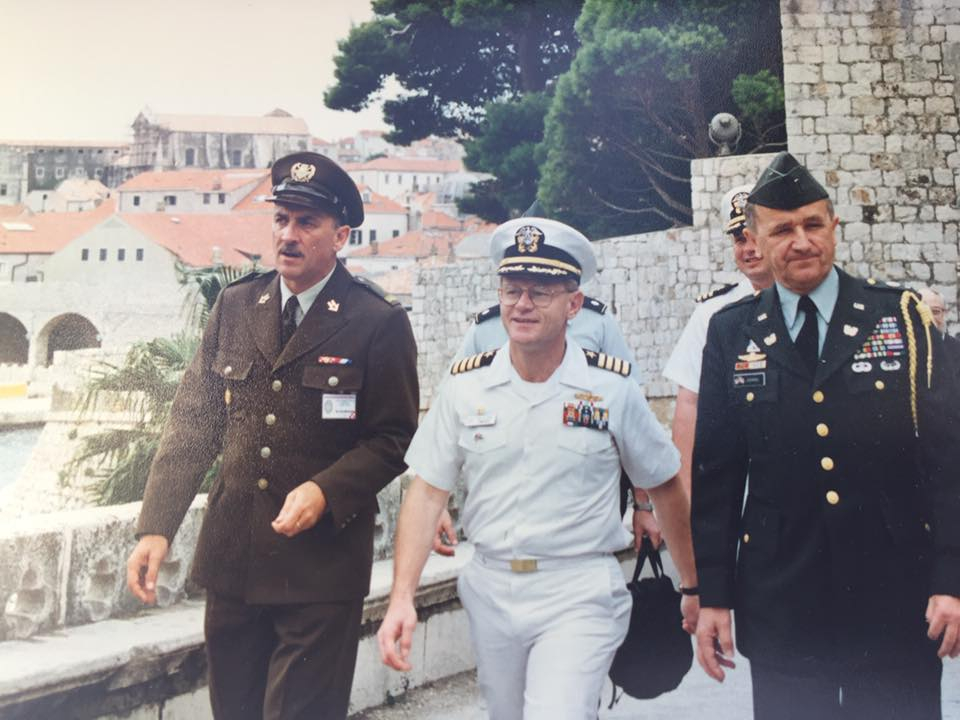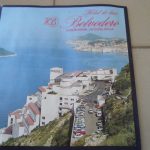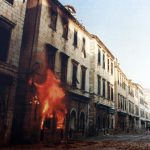As Dubrovniknet/Lidija Crncevic writes, not for one second did Miso Mihocevic consider packing his bags, abandoning his city and removing his life from danger as Dubrovnik began being attacked, even though the smell of war was very much lingering in the air.
He could have quite easily left the city, he had his connections and ties. He could have gone anywhere and continued living a safe and quite normal life. He didn’t. He stayed. He got involved in defending the country and city from the marauding Serbs in the best possible way he knew how. He was a negotiator, a translator, an interpreter… he often had to store away his emotions and wrap them tightly in a thick proverbial piece of rope in order to retain composure and behave in a diplomatic way when dealing with various representatives of the aggressor army.
”You know what you need to say” Commander Nojko would tell him when they were heading towards occupied Cavtat, the southernmost town in the country. When the Croatian team of negotiators went down to Cavtat to engage in negotiations, they could never know for sure whether they would return to the City of Dubrovnik or whether the Serbs would “redirect” them to the infamous Morinj. We look back 30 years ago in Dubrovnik’s history with Miso Mihocevic, going back to the beginnings.
You made your choice to stay in the city, although, objectively speaking, you could have gone elsewhere, perhaps abroad, and continued with life as you’d known it…
Actually, I’d returned to Dubrovnik a few years before any of these dark times began. after a dozen or so very easy years spent abroad in high fashion and of course mingling among fashion circles. I was young, I had my health, and I was good looking. Could it be better?! Well, actually… Yes, it could! What was missing? Something was… something very big. An invisible piece of me. A piece of a more complete and fulfilled version of myself where I’m not a stranger, not foreign… in a place where despite all the good times, you’ll never really fully integrate, not completely.
“The sun of another’s sky” is a terribly thorough and precise conclusion and description of that feeling. It’s a well-known ”condition” for which we have a very nice and accurate word: homesickness. I mean, I lived quite well, but the sun still didn’t warm my bones up like the one which beats down on Banje beach does, allegorically and in reality. Being complete, fulfilled, recognising and understanding your society and its forces is the true kind of most often totally unconscious type of love. It’s immeasurable. It was easy for me because I had the most beautiful lover – Dubrovnik.
A career or love? I was lucky as I had both, I expressed myself relatively quickly through the Dubrovnik Summer Festival (where I spent all my summers from the age of fifteen). That’s how much love there was. With another extremely important element, I’m the type of person you can say anything to, but to insinuate that I’m not a Croat or, even worse, that I must be ashamed of being one… I’d never been able to stand that, even from a very young age. The reaction in me when I hear something like that is instant rage.
To escape meant only an escape from oneself, not from those toothless Chetniks. Not only to be left without everything, but also to be left with some eternally unhappy room under someone else’s sun that doesn’t warm me up in the same way.
Today, 30 years after the start of the war in Dubrovnik, you’re not in the city, where are you now, what are you doing, why did you decide to go?
I’m in Zagreb, quite happily and comfortably retired, I work in translation on my own watch when I feel like it, I recently finished translating a very interesting book into English, I write articles from time to time for Total Croatia News, I haven’t been in any commercials lately as was the norm until the world changed, coronavirus isn’t really allowing for any of that. But what’s the most important thing of all – I’m the master of my time. I read, I browse the web, I like to be sarcastic on Facebook… Of course, there’s always briskula (briscola). The days are short but never tiring or boring, because after so long, there’s no dictation.
Why did I move out of the city? That’s a good question. Back in 2010, Vlahusic, when he had freshly become Dubrovnik’s mayor, kicked me out of the theatre (literally!) overnight (literally!) and left me on the street, so to speak, which I only found out about when reading a local portal the next day. Now, when hearing that, you’ll surely think I’m furious, right? Quite on the contrary. I’d like to thank him because he saved me from the type of city it had become to allow such a mayor to ”take the throne”.
And a theatre, and I honestly do have to say this, for whom the first play after my removal – was a fantastic piece called ”Orchestra” located in a Bosnian turbo cafe… Well, it isn’t worth talking about. The worst sacrilege Bond experienced from 1862 to the present day. So… off I went to Zagreb, and I got a big role in a film, then in some commercials, etc.
So, Mr. Vlahusic, thanks again! I had been trying to do something in Dubrovnik as well, of course. For example, my friends and I raised about 2 million kuna over in England to return the opera to the Summer Festival after years – which they dropped the following season, and not because it was bad… There is an ever-present shitty ego, that shitty Croatian jealousy that many have come into contact with. It is all actively manifested through malice and meanness. Unfortunately, I had the opportunity to experience all of that even after Vlahusic. An employee of his, with all his internal issues and malice concluded that I’m angry and offended because I’m no longer the main cultural face of the city. The problem isn’t in any kind of insult, but in the desperate fact that there’s no other ”first person” after me.
Behind you is a respectable war record… you were a negotiator, you were a translator, you had a lot of contact with foreign envoys in Dubrovnik. When it became clear to the international community what was happening in Croatia, that it wasn’t merely a civil war, but the aggression of one country against another, was it difficult for you to deal with your nerves and emotions, to stay calm in the negotiations with the Yugoslav Army? What was the most demanding part of it all?
”There were certainly plenty of demanding tasks and demanding moments. Translation wasn’t a problem, in fact, I asked a few of ”theirs” to please step aside because I’d corrected them and asked them to please translate accurately, so I never saw some of them in those meetings again. At the legendary meeting on the ”Avenger”, the Serbian translator got something completely wrong, I insisted on a correction, he, logically, totally lost his mind about it, so one of their generals asked me to translate for them as well. The job of a liaison officer, on the other hand, often requires the need to try to cope in a very complicated situation on the spot. My dear Commander Nojko always said goodbye to me with ”you know what you’re going to say”, which sometimes made my head spin, from the effort and the awareness of the responsibility there was. It’s a war, not a theatrical play.
The negotiations, almost until the recognition of the Republic of Croatia as an independent country, were the ultimate tests of the nerves, amplified by external factors such as burned down houses in Konavle, contorted faces and local Croatian people’s eyes full of hope, waiting to see if they were allowed to be out on the waterfront in Cavtat when we came, and possibly then again when we left. You had to wrap your emotions up in a tight rope even when you felt like you were going to explode, then, self-control must be at its strongest. It doesn’t come out of fear, when you’re angry you aren’t afraid, but out of the pure awareness that you have to be controlled in order to possibly get some result. Those first few months when they were quick, unstoppable and unruly, used to be just a ”test”- with the objective possibility that you would end up in Morinj that day instead of going back home.
What is your most traumatic experience from the war?
Overall, and at its core, everything is a huge trauma. It was a terrible school of life in which, however and despite all of the awful things, one can learn a lot about empathy and love for others. War is a struggle for life and death is built into its basic settings. Death was in the air when that psychopath, Captain Milan Zec, wanted to kill us in Cilipi near the airport runway, the upper edge of which was surrounded by with bearded, toothless Chetniks.
One’s first encounter with what might come to be their own death is certainly not an empathic experience. Everything else I experienced from them would fall mostly into the “service life” and nothing more would be thought about it. By all accounts, I am an anti-Rambo guy who surprised himself when he realised, in the first days of the spread of Serbian culture, that the Chetniks weren’t something he was afraid of at all, because of the reasons mentioned above, because I was furious. So, one cloudy day, some ununiformed people, who this time had a few more teeth between them, took us to the Hotel Epidaurus (Cavtat). And there in some big hallway, or some form of storage room for beach equipment, were our grandmothers, aunts, local Konavle women in costumes, lined up like logs next to each other on summer deckchairs. I ran outside, and I cried and cried. “They” must have rejoiced over the crying ”Ustasha”. No one had shot at me, but I had been hit in the heart.
How did you experience the recent departure of the representatives of the Dubrovnik and Konavle authorities to Morinj, and what are your feelings about the memorial plaque to Milan Milisic in Zupska street?
This visit to Morinj does make sense as a memorial and a little attention comes with it, perhaps as a small hope that a true historical memory could come to life there. We need to wait another generation, then we’ll see. The memorial plaque to my friend Milan Milisic is, according to the Serbs, the worst monument of Serbian fascism.
The news from Croatia’s surrounding countries is becoming more and more concerning and more and more aggressive – Montenegro and the swimming pool named after one of the villains from Morinj… Dodik wants to separate Republika Srpska, in nearby Trebinje Serbia is building an airport with Bosnia and Herzegovina…. where is all of this going to lead and are there any answers Croatia can provide in response to that?
I have the same impression I had from the census carried out back in 1991 when it seemed that there were at least 40 percent of ethnic Serbs in Croatia, as loud as they were, so it seems to me that this is the case in Montenegro today, that it is as dangerous as it was for us back then. I don’t see a way out for them, even if they remember that they were ”brothers” back in the 1990s, or even if they forget about it.
The Serbian obsession with their celestiality is of a genetic nature. They’re much more alone than they seem and are constantly advancing in this. Because almost every day they have something for the public that in its essence serves to keep the government in power, all of them, including that irritated peasant from Banja Luka. The Serbian world, while the major of the Greater Serbia celestial armed detachments has a salary of a mere 400 euros, is busy building an airport in another country. The question is, what is this other country doing? Croatia can do a great deal if it gets rid of crime, corruption and other local phenomena, in order to become a respected EU member state, as well as one of NATO, and not be considered a ”poor Balkan territory”.
When you look back, what do you see as Croatia’s biggest missed opportunity? Given the current situation…
”There perhaps hasn’t even been a ”biggest missed opportunity” because the people have never been offered one. The repeal of the Property Origin Act in 1990 was the last, not the first nail in the coffin, though.
Did you perhaps stay in touch with people, foreign envoys, friends of Croatia during the war?
Not too much, there are a few ‘‘Merry Christmas’’ greetings here and there and mostly, some are no longer among us, as in everything, time changes us, opportunities take us away. And the war itself, as a factor of our acquaintances and friendships, is fading in active memory.
Have you ever told or revealed everything you saw or heard during the war in Dubrovnik, during the negotiations? Have you succumbed to the “temptation” that you might write a book. If you did write one, what genre would it be?
If I were to reveal literally everything, I’d need some very extensive format. I tell my friends when something reminds me of something from the war, without hesitation, it’s been harmless to me emotionally now for a long time. As for the book, I have a few people in my closest circle who keep nagging me to write a book. One of them would even sponsor a typist. I guess it’s worth it, that experience of war from that little-known standpoint, one from a non-combat angle. Maybe in some way I’m obliged to leave a mark in such a way and I do think about it here and there. I should enjoy this retirement-induced freedom a little less, it seems, and maybe start that famous “one day” project.
For more from Miso Mihocevic, you can follow him here and watch an interview between him and Borna Sor here.











